|
|
|
Sort Order |
|
|
|
Items / Page
|
|
|
|
|
|
|
| Srl | Item |
| 1 |
ID:
153671


|
|
|
|
|
| Summary/Abstract |
This article explores three key arguments: Firstly, it seeks to demonstrate the contradictions and limits within Kantian hospitality, and its links to colonialism and practices of racialisation. The acclaimed universalism of Kant’s law of hospitality forecloses a discussion of its dualism, and erases the historical, racist context in which it was conceived. The prioritization of concept over conception allows Kant’s theory on race to be obscured from official discourse and framing of policies while it still courses through inherited perceptions and theories. Secondly, in making my case, I will be applying the notion of coloniality, coined by Aníbal Quijano and later developed by Walter Mignolo, to the existing but small body of critical discourse on Kant and race. Debates initiated on the peripheries of philosophy, law and anthropology in the 1990s have led the way in this regard. However, given the time that has elapsed, it is notable that their work has received little scrutiny in political theory and International Relations theory, and thus warrants renewed attention. I argue that the notion of coloniality provides a useful lens through which to do so, and a vehicle through which to apply those excavations to a contemporary context. Finally, the article explores the extent to which Kantian thought constitutes ‘modern’ cosmopolitanism, and draws attention to the inadvertently complicit role of second-generation cosmopolitans in the erasure of race from the study of Kant. The relationship between the collective erasure of race and racism in academia and European practice towards refugees and immigrants is briefly considered.
|
|
|
|
|
|
|
|
|
|
|
|
|
|
|
|
| 2 |
ID:
153669
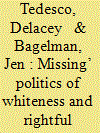

|
|
|
|
|
| Summary/Abstract |
This article engages the global nexus of colonisation, racialisation, and urbanisation through the settler colonial city of Kelowna, British Columbia (BC), Canada. Kelowna is known for its recent, rapid urbanisation and for its ongoing, disproportionate ‘whiteness’, understood as a complex political geography that enacts boundaries of inclusion and exclusion. The white urban identity of Kelowna defines Indigenous and temporary migrant communities as ‘missing’ or ‘out-of-place’, yet these configurations of ‘missing’ are politically contested. This article examines how differential processes of racialisation and urbanisation establish the whiteness of this settler-colonial city, drawing attention to ways that ‘missing’ communities remake relations of ‘rightful presence’ in the city, against dominant racialised, colonial, and urban narratives of their absence and processes of their displacement. Finally, this article considers how a politics of ‘rightful presence’ needs to be reconfigured in the settler-colonial city, which itself has no rightful presence on unceded Indigenous land.
|
|
|
|
|
|
|
|
|
|
|
|
|
|
|
|
| 3 |
ID:
153667


|
|
|
|
|
| Summary/Abstract |
The zombie, as a Western pop culture icon, has taken up residence in International Relations. Used both humorously and as a serious teaching tool, many scholars and professors of IR have written of the zombie as a useful figure for teaching IR theory in an engaging manner, and have used zombie outbreaks to analyse the responses of the international community during catastrophe, invasion, and natural disasters. The authors of this article would like to unearth another aspect of the zombie that is often left unsaid or forgotten: namely, that the body of the zombie, as a historical phenomenon and cultural icon, is deeply imbricated in the racialisation of political subjects and fear of the Other. Through a critical analysis of biopower and race, and in particular Weheliye’s concept of habeas viscus, we suggest that the figure of the zombie can be read as a racialised figure that can provide the means for rethinking the relationship of the discipline of IR to the concept of race. We read The Walking Dead as a zombie narrative that could provide a critical basis for rethinking the concepts of bare life and the exception to consider ‘living on’ in apocalyptic times.
|
|
|
|
|
|
|
|
|
|
|
|
|
|
|
|
| 4 |
ID:
153672
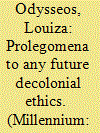

|
|
|
|
|
| Summary/Abstract |
Decolonial thought has wrought a devastating critique on the Academy and wide-ranging fields within it. Decolonial critique entails undeniable and multiple ethico-political orientations arising from concrete struggles within the ‘unfinished project of decolonization’ (Maldonado-Torres), as well as recent articulations of decolonial ethics. This article argues that, as decolonial critique, and calls for decolonial ethics, begin to find their way into broader theoretical discussions in the social sciences and humanities, it may be more fruitful to insist on the question of decolonial ethics. It encourages retaining the disruptive potential of decolonial critique by resisting its immediate translations into available ethical registers and traditions that unwittingly reassert, and remain bound to, forms of ethical expression dependent on generalised narratives, which occlude their histories of violent and racialised exclusion and masterful figurations of ethical subjectivity. Outlining Sylvia Wynter’s excavation of prominent figurations of the human as ‘Man’, I argue that our conceptions of ethical subjects too rest on such figurations. The article, therefore, discusses three prolegomena to any future decolonial ethics: the decolonial critique and displacement of the figure of ‘Man’ as ethical subject within racialised coloniality; the development of a decolonising poetics, whose ethos of irreverence seeks forms of poetic revolt that draw on struggles to question systems of ethical thought and knowledge; finally, a discussion of the contours of a praxis of being hybridly human through the development of ‘education’ as an incessant and ‘unfinished’ project.
|
|
|
|
|
|
|
|
|
|
|
|
|
|
|
|
| 5 |
ID:
153664
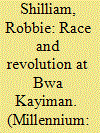

|
|
|
|
|
| Summary/Abstract |
It is no longer remarkable to claim that, out of all the revolutions in the making of the modern world order, the Haitian Revolution was the most radical and remains the most challenging to Euro-Western narratives. The Haitian Revolution did what no other did – end slavery – in an age when white Europeans and North Americans spoke of natural rights and freedoms while they remained traffickers and brutal exploiters of African flesh. The stakes at play are significant: To theorise and narrate the Haitian Revolution is to necessarily take part in a struggle over the authorship of the meaning of global justice and modern freedoms. But as we deepen our understandings of the Revolution we must grapple more audaciously with the intellectual strictures that have in various ways ‘silenced’ these struggles of enslaved Africans. Race informs these silencings. Fundamentally, race silences the response to slavery. In this article, I return to Bwa Kayiman – the meeting that inaugurated a world-shaking response.
|
|
|
|
|
|
|
|
|
|
|
|
|
|
|
|
| 6 |
ID:
153668
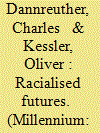

|
|
|
|
|
| Summary/Abstract |
This article explores the relationship between race and finance. By looking closer at risk, this article seeks to contribute to the literature in three ways: First, the concepts of risk and uncertainty need to be understood from a post-colonial perspective. Second, through a post-colonial reading of risk, we seek to develop a different concept of risk itself which emphasises its three qualities of de-humanisation, de-socialisation, and de-territorialisation. Last but not least, we propose to understand the post-colonial critique not only as a reconstruction of Europe’s past, as Dipesh Chakrabarty has named it, but locate it at the intersection of the present and the future: The post-colonial critique is enacted as soon as Europe’s future is imagined through risk.
|
|
|
|
|
|
|
|
|
|
|
|
|
|
|
|
| 7 |
ID:
153663
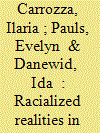

|
|
|
|
|
| Summary/Abstract |
From Brexit and the election of Donald Trump, to the horrors of Aleppo and the global migrant crisis, 2016 was a year that seemingly hardened the global colour line. In the United States, the Black Lives Matter movement struggled against domestic racism and police brutality, punctuating the myth of a post-racial and colour blind America. In the Mediterranean, migrant deaths hit a record high as Europe increasingly slammed its door shut. In Cape Town and Oxford, students called for a decolonisation of the university campus and curriculum, as well as the immediate removal of the statue of Cecil Rhodes.
|
|
|
|
|
|
|
|
|
|
|
|
|
|
|
|
| 8 |
ID:
153670
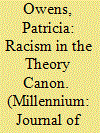

|
|
|
|
|
| Summary/Abstract |
Hannah Arendt’s monumental study The Origins of Totalitarianism, published in 1951, is a founding text in postcolonial studies, locating the seeds of European fascism in the racism of imperial expansion. However, Arendt also harboured deep racial prejudices, especially when writing about people of African descent, which affected core themes in her political thought. The existing secondary literature has diagnosed but not adequately explained Arendt’s failures in this regard. This article shows that Arendt’s anti-black racism is rooted in her consistent refusal to analyse the colonial and imperial origins of racial conflict in the United States given the unique role of the American republic in her vision for a new post-totalitarian politics. In making this argument, the article also contributes to the vexed question of how international theorists should approach important ‘canonical’ thinkers whose writings have been exposed as racist, including methodological strategies for approaching such a body of work, and engages in a form of self-critique for marginalising this problem in earlier writing on Arendt.
|
|
|
|
|
|
|
|
|
|
|
|
|
|
|
|
| 9 |
ID:
153666


|
|
|
|
|
| Summary/Abstract |
This article questions recent critiques of Eurocentrism for silencing religion in favour of either culture or race. Quite ironically, these critiques draw from a Eurocentric spatio-temporal horizon embedded in Enlightenment thinking. A crucial element of that horizon is a tacit acceptance of secularity as the ontological condition of differentiation, reflected in wholescale acknowledgement of the ascendancy of Scientific Racism and the displacement of religiosity. International practice increasingly manifests the confluence of religion and race and the difficulty of separating the two in explaining processes of differentiation and exclusion. Without adequate recognition of religion in critiques of Eurocentrism and sufficient appreciation of race in postsecular theorisation, the two frames of capture are likely to remain apart. In the first instance, critiques of Eurocentrism in IR cannot pretend to fully disown Enlightenment’s spatio-temporal horizon whilst wedded to its secular commitments. In the second instance, postsecular thinking risks reproducing its own version of Eurocentrism without recognising race as a crucial marker of differentiation, not reducible to religious difference. A dialogical encounter and convergence between the two registers of critique can provide new openings for understanding.
|
|
|
|
|
|
|
|
|
|
|
|
|
|
|
|
| 10 |
ID:
153674


|
|
|
|
|
| Summary/Abstract |
This article briefly examines the contributions to International Relations (IR) theory of W.E.B. Du Bois and Alain Locke. Taking as a point of departure the recent work of Robert Vitalis1 on the ‘Howard School’ of IR of which these two were prominently associated, I both embrace and challenge Vitalis’ thesis on the importance of these two African American scholars to the academic field of IR. Embracing Vitalis’ invaluable articulation of the Howard School’s critique of white supremacist arguments prevalent in IR at its founding and well beyond, I also challenge Vitalis’ apparent disassociation of these scholars from the formulation of IR theory. Instead, I discuss how Du Bois and Locke provided some of the earliest theoretical arguments on the role of ‘national imperialism’ in modern war, as well as theses of cultural change and its impact on international relations.
|
|
|
|
|
|
|
|
|
|
|
|
|
|
|
|
| 11 |
ID:
153673


|
|
|
|
|
| Summary/Abstract |
Racism reflects how we think and act as much as what. It manifests in terms of biology, geography, and culture but reflects an episteme that normalises Self and Other into a bordered binary. Here, a trialectical epistemology can help. It dissolves racialised realities by showing how opposites exist in each other, thereby constituting a three-ness – e.g. self-in-other and other-in-self – that links Self and Other despite mutual antagonisms. From such trialectics, epistemic compassion can arise. It enables learning from the Other through what Buddhists call ‘interbeing’ or the recognition that ‘you are in me, and I in you’. Reciprocity thus becomes key. The Self cannot violate the Other without also violating itself; likewise, loving the Other effectively loves the Self. Flat, monochromatic binaries like ‘black’ versus ‘white’ cannot continue and colour revivifies world politics, both literally and figuratively. I apply trialectics to the ‘border problem’ between India and China as an analogy.
|
|
|
|
|
|
|
|
|
|
|
|
|
|
|
|
| 12 |
ID:
153665
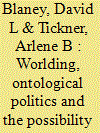

|
|
|
|
|
| Summary/Abstract |
This article argues that attention to representational practices and epistemology, however important for expanding the boundaries of International Relations as a field of study, has been insufficient for dealing with difference in world politics, where ontological conflicts are also at play. We suggest that IR, as a latecomer to the ‘ontological turn’, has yet to engage systematically with ‘singular world’ logics introduced by colonial modernity and their effacement of alternative worlds. In addition to exploring how even critical scholars concerned with the ‘othering’ and ‘worlding’ of difference sidestep issues of ontology, we critique the ontological violence performed by norms constructivism and the only limited openings offered by the Global IR project. Drawing on literatures from science and technology studies, anthropology, political ecology, standpoint feminism and decolonial thought, we examine the potentials of a politics of ontology for unmaking the colonial universe, cultivating the pluriverse, and crafting a decolonial science. The article ends with an idea of what this might mean for International Relations.
|
|
|
|
|
|
|
|
|
|
|
|
|
|
|
|
|
|
|
|
|